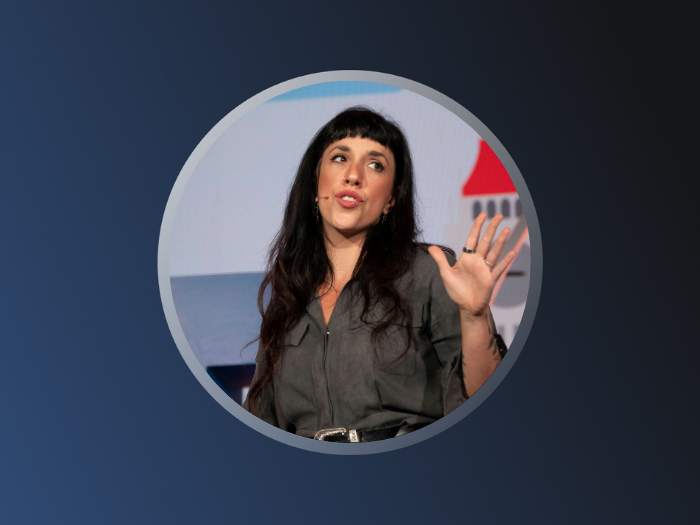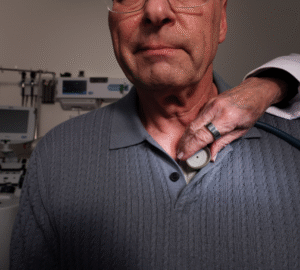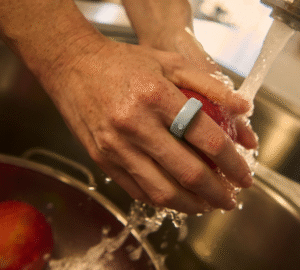When it comes to career success, sleep is all too often an after-thought. Science, however, says otherwise—as do these entrepreneurs, executives, and other high performers.
Their stories prove that sleep is actually a must-have, not a nice-to-have, when it comes to achieving success and balance in both work and life.
Read on to learn how a commercial airline pilot, pharmacist, executive coach, CEO and mother of two, as well as other high achievers use Oura to pursue success and stay on top of their game.
What’s your Oura story? We’d love to hear it.
Graham S.

A commercial airline pilot, Graham uses Oura to ensure he stays sharp in the cockpit for long-haul flights. For instance, he monitors his stress levels during flights and his blood oxygen (SpO2) levels after flying, and he follows Oura’s guided meditations to help him unwind when he needs to get a good night’s rest.
Oura’s comprehensive health tracking has also provided him with some additional benefits. “Oura has motivated me to do more zone 2 training [exercise performed at 60-70% of your maximum heart rate], and my Cardio Capacity has really benefited. It’s ‘High’ on Oura and in the excellent range for my age group.” he says. “More zone 2 training has also helped me lower my Cardiovascular Age by one year! Exercise is crucial for pilots to combat the effects of long hours, high altitude, and varying time zones.”
READ MORE: Learn How to Improve Your Cardio Capacity (VO2 Max)
Favorite Oura feature: Experiments
“The caffeine Experiment on Oura was eye-opening. Like many pilots, I love coffee and thought I was immune to its effects on sleep. However, the experiment showed that caffeine did impact my sleep quality and duration. Now, I limit my coffee intake to the morning or use it strategically as a stimulant if I’m not planning to sleep on a flight.”
RELATED: How To Conduct A Self-Experiment With Oura
Hitha Palepu

Hitha Palepu is a NYC-based CEO, entrepreneur, author, speaker, and content creator—a veritable “multi-hyphenate.” In addition to her career success, Palepu is a busy mother of two boys who uses Oura to help her slow down.
When things get “crazy” at work, she tells us that following Oura’s insights allows her to adjust her schedule or routine to ensure she is taking care of herself during stressful times.
For instance, if she has a low Sleep or Readiness Score, Palepu will opt for a lower-intensity walk in Central Park rather than a high-intensity Peloton ride. “Oura has helped me live in a better, steady state, instead of constant highs and lows,” she says.
Hitha’s tip: Use Oura’s concrete data to find your personal “sweet spot” for sleep. “Having sleep data has helped me discover what works best for my body,” Palepu notes. “For example, I’ve heard recent research that says women need more sleep than men—between 8 and 9 hours. But from using Oura, I’ve been able to identify that my sleep sweet spot is 7 hours. Anything more and I feel sluggish.”
Favorite Oura feature: Chronotype
“I always thought I was a night owl. But Oura showed me that I have a morning chronotype! While I might feel creative in the evening, I have greater cognitive capacity in the mornings. This discovery has had a direct impact on my productivity,” she says.
Sam Tejada

An author, podcast host, and chairman of the American IV Association, Sam founded Liquivida, a wellness center that specializes in intravenous (IV) therapy and preventative care. He owns 32 franchise locations across the U.S.
Being a business owner and entrepreneur means he doesn’t have time to get sick, so he uses Oura to take steps to preempt illness so he can stay productive.
Plus, with his Oura data, Sam has been able to discover correlations such as the fact late-night eating keeps his heart rate up during sleep, and that having too many stressful meetings in a day lowers his heart rate variability.
“The data is undeniable,” says Sam. “Oura allows you to make informed decisions about your health and wellness. That’s why I love using Trends view, to see how my health changes over time.”
Favorite Oura feature: Readiness Score
“I rely a lot on my daily Readiness Score. I’ve noticed that it’s very accurate with how ‘ready’ I feel to take on the challenges of my day. If my score is low, I immediately make adjustments to compensate,” says Sam. “For instance, I might get an NAD [nicotinamide adenine dinucleotide] IV, take certain supplements, pay extra attention to what I’m eating, and make sure I’m drinking plenty of water to improve how I feel.”
Natalia J.

Natalia is a market business strategist at YouTube who travels the world giving presentations to thousands of people. While she loves her work, her busy schedule can lead to stress, bad sleep, and sedentary days.
Since using Oura, Natalia pays close attention to her Readiness Score. Despite ignoring the insights at first, she has learned that responding to her body’s needs allows her to perform better at work.
“After a while of using Oura, I started to realize that when I am more relaxed, well-slept, and well-recovered, I perform my best,” she notes. “I deliver presentations more naturally, I can share better jokes on stage, and I face challenges at work with a clearer mind.”
Since using Oura, Natalia has also learned the importance of taking breaks. “I have a tendency to overdo everything: too much exercise, too much work, too much travel. With Oura’s insights, I learned how to be more mindful of overdoing it. I’ve learned to respect and understand my body.”
Favorite Oura feature: Daytime Stress
Natalia has been practicing meditation for a few years, but seeing her daily stress levels on Oura made her realize that it wasn’t helping lower her stress levels enough. Now, when her stress levels reach Engaged or Stressed in the Daytime Stress feature, she takes a break. “This constant feedback on my stress levels has helped me to be more proactive with managing my stress—rather than only doing so when I am already relaxed.”
READ MORE: Reframing Stress: The Difference Between “Bad” and “Good” Stress
Andy L.

As a partner at a Big Four accounting firm, Andy’s role involves extensive international travel. “I can easily find myself in a different city every week, sometimes multiple times a week,” he says. This involves overnight flights and multiple time zones, while still requiring him to be in the office every day. He uses Oura to help combat jet lag and keep him feeling sharp.
To avoid jet lag and align his circadian rhythm, Andy adjusts his sleep schedule, light exposure, and even meal times to mirror his new time zone before he even gets on his flight.
Andy also monitors his Activity Score to make sure he stays active, which is particularly important when traveling. “I rarely have time for a long gym session, so I often find myself doing a quick HIIT workout in my hotel room or going for a walk. Interestingly, I’ve found that on days that I walk, my HRV stays stable—even if my Sleep and Readiness Scores dip!”
Favorite Oura feature: Heart Rate Variability (HRV)
“I’ve learned that HRV is your body’s stress signal, so if it starts to lower, I take it as a serious sign that I need a break from work. Prior to Oura, I would have ignored my body’s signals and pushed on with work. So having this data has actually helped me find a better work/life balance,” he notes.
READ MORE: 8 Myths About HRV, Debunked
Samah A.

Based in Sweden, Samah works at Google, where she first heard about Oura from colleagues. Struggling with sleep, Samah decided to try Oura—and was shocked to discover that she was only getting a few hours of sleep each night.
She started to notice that the lack of sleep was impacting her mood and behavior, “I would try and power through each day, but felt very stressed.”
Samah started to learn more about sleep hygiene, the importance of winding down before bed, maintaining a consistent sleep schedule, and getting in more daily movement. Now, she sleeps 7 to 8 hours a night. “I have so much more control over my emotions. I’m clear-headed, and I feel good all day.”
Samah was also surprised to discover that her daily inactive time was 11 hours when she first started using Oura. She works in an office all day, and by the time she finishes work, it’s usually dark and cold.
“I realized that walking more helps me release a lot of bottled energy. So now, it’s a non-negotiable for me. Regardless of how dark, cold, or snowy it is, I will go out and take a walk. This, plus better sleep, has made a huge difference to my mental health.”
Favorite Oura feature: Bedtime Guidance
Oura notified Samah that she should start getting ready for bed at 8:45pm for a 10pm bedtime. It was way earlier than she expected, but decided to listen to it. She noticed that it helped her fall asleep easier, and get better quality sleep.
Linda D.

As a pharmacist, Linda works 12-hour shifts from 9am to 9pm, standing the entire time. Optimizing her sleep is essential to make sure she has enough energy and mental clarity to last the whole shift.
Using Oura, Linda has discovered the importance of sleep hygiene for high-quality sleep: “I use blackout blinds, a heavy blanket, have a strict nighttime routine, and sleep in a cool bedroom—all of which helps ensure I get 7.5 hours of sleep. With Oura, I’ve been able to isolate these variables, so I know they contribute to a better night’s sleep.”
Additionally, before Oura, Linda would finish her 12-hour shift and go straight to the gym for a HIIT class. But she noticed this keeps her heart rate elevated during sleep, and she wakes up feeling drained. Now, she opts for a yoga sculpt or barre class, and saves the HIIT sessions for her days off.
| Member Tip: Your daily activity goal on Oura is automatically adjusted based on your Readiness Score. When your Readiness Score is high, your goal will increase as well. When it’s lower, it’s time to prioritize recovery. |
Favorite Oura feature: Sleep Latency
“Sleep Latency helps me see how exhausted—or overstimulated—I am after a shift at work. When I go to sleep immediately and my latency is low, it’s a sign I’m overtired. If my latency is too high, it’s a sign that my brain is overstimulated,” she explains.
This has helped her identify that switching her Kindle for a physical book (to combat blue light exposure), and taking a warm shower helps her unwind for bed.
Raul Villacis

Raul is an entrepreneur and CEO of minority-owned and operated, ARG Advisors, a real estate firm, as well as CEO of The Next Level Experience, a personal development and mindset coaching business. As a coach who motivates people to become their best selves, personally and professionally, Raul knows that good sleep, adequate recovery, and stress management are vital pieces of the puzzle.
“Every morning, I look at my REM sleep and deep sleep contributors. If they’re on the low side, I know my energy levels will be affected. I take time to look at what I did the night before—maybe it was eating sugar, exposure to blue light from my phone, or having alcohol.”
| Member Tip: Tag your habits consistently on the Oura App to access Discoveries, which highlight meaningful associations between a certain tag and a biometric change. |
“I often talk about finding your edge—and there’s no edge without execution! Simply put, Oura helps me execute by keeping me accountable,” says Raul. “In fact, I actually stopped drinking alcohol after seeing the data on how badly it impacted my sleep.”
Favorite Oura feature: Circles
“I created an Oura circle with my wife and it’s taught us a lot about each other and helped us become more compassionate. If I see she has a low Readiness or Sleep Score, it helps me understand why she might be having a bad day. She often says sleep is her love language, but prior to Oura, it used to bother me that she wasn’t waking up early. Now I know that she needs more sleep, particularly in the mornings, in order to get a good Sleep Score and feel her best.”
READ MORE: Sober Curious? 6 Proven Strategies to Drink Less











